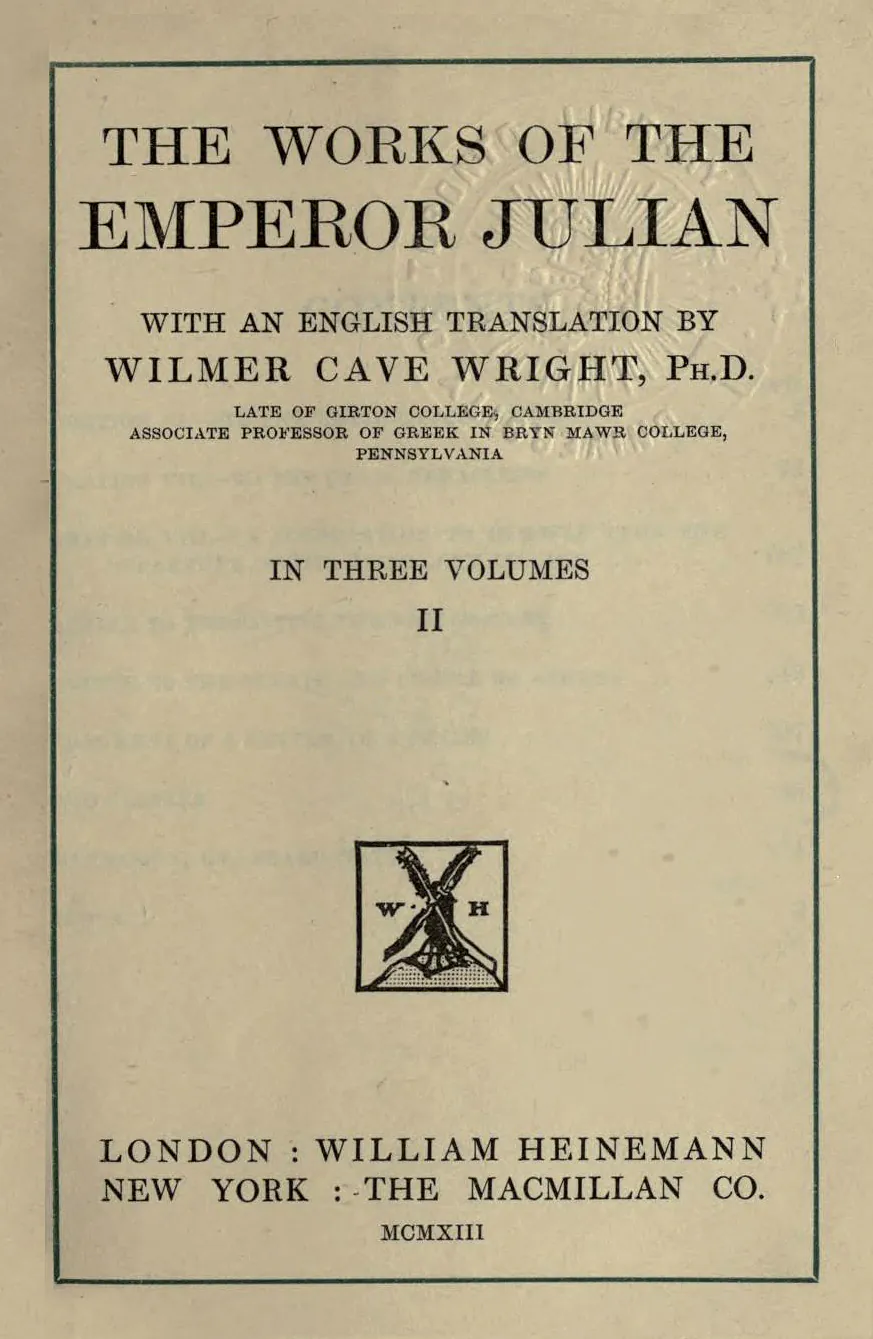[A]
ὃς ὑπὸ ἀφροσύνης οὐ συνὴκα, ποταπὸν ἐξ ἀρχῆς τὸ τῆσδε τῆς πόλεως ἦθος, καὶ ταῦτα τῶν ἡλικιωτῶν τῶν ἐμῶν, ὡς ἐμαυτὸν πείθω, βιβλία ἀνελίξας οὐδενὸς ἀριθμὸν ἐλάττω. λέγεταί τοί ποτε τὸν ἐπώνυμον τῆσδε τῆς πόλεως βασιλέα, μᾶλλον δὲ οὗπερ ἐπώνυμος ἥδε ἡ πόλις συνῳκίσθη· πεπόλισται1πεπόλισται Cobet, Hertlein approves, πεποίητα. μὲν γὰρ ὑπὸ Σελεύκου, τοὔνομα δὲ ἔχει ἀπὸ τοῦ Σελεύκου παιδός· ὃν δή φασι δι ̓ ὑπερβολὴν ἁβρότητος
[B]
καὶ τρυφῆς ἐρῶντα ἀεὶ καὶ ἐρώμενον τέλος ἄδικον ἔρωτα τῆς ἑαυτοῦ μητρυιᾶς ἐρασθῆναι· κρύπτειν δ ̓ ἐθέλοντα τὸ πάθος οὐ δύνασθαι, τὸ σῶμα δ ̓ αὐτῷ κατὰ μικρὸν τηκόμενον ἀφανῶς οἴχεσθαι, καὶ ὑπορρεῖν τὰς δυνάμεις, καὶ τὸ πνεῦμα ἔλαττον εἶναι τοῦ συνήθους. ἐῴκει δ ̓ οἶμαι τὰ2τὰ Hertlein suggests, τὸ MSS. κατ ̓ αὐτὸν αἰνίγματι, σαφῆ μὲν οὐκ ἐχούσης αἰτίαν τῆς νόσου, μᾶλλον δὲ οὐδ ̓ αὐτῆς,
[C]
ἥτις ποτέ ἐστι, φαινομένης, ἐναργοῦς δ ̓ οὔσης τῆς περὶ τὸ μειράκιον ἀσθηνίεας. ἐνθάδε μέγας ἆθλος ἰατρῷ προυτέθη τῷ Σαμίῳ τὴν νόσον, ἥτις ποτέ ἐστιν, ἐξευρεῖν. ὁ δὲ ὑπονοήσας ἐκ τῶν Ὁμήρου, τίνες ποτέ εἰσιν αἱ γυιοβόροι μελεδῶναι, καὶ ὅτι πολλάκις οὐκ ἀσθένεια σώματος, ἀλλ ̓ ἀρροστία ψυχῆς αἰτία γίγνεται τηκεδόνος τῷ σώματι, καὶ τὸ μειράκιον ὁρῶν ὑπό τε ἡλικίας καὶ συνηθείας οὐκ ἀναφρόδιτον, ὁδὸν ἐτράπετο τοιαύτην ἐπὶ τὴν τοῦ νοσήματος θήραν.
[D]
καθίζει πλησίον τῆς κλίνης ἀφορῶν εἰς τὸ πρόσωπον τοῦ μειρακίου, παριέναι κελεύσας καλούς τε καὶ καλὰς ἀπὸ τῆς βασιλίδος ἀρξαμένους. ἡ δ ̓ ὡς ἦλθεν, ἐπισκεψομένη δῆθεν αὐτόν, αὐτίκα ἐδίδου τὰ συνθήματα τοῦ πάθους ὁ νεανίας, ἆσθμα τῶν θλιβομένον ἠφίει, ἐπέχειν γὰρ αὐτὸ κινούμενον καίπερ σφόδρα ἐθέλων οὐχ οἷός τε ἦν, καὶ ταραχὴ ἦν τοῦ πνεύματος καὶ πολὺ περὶ τὸ πρόσωπον ἐρύθημα.
[A]
For it was due to my own folly that I did not understand what has been the temper of this city from the beginning; and that too though I am convinced that I have turned over quite as many books as any man of my own age. You know of course the tale that is told about the king who gave his name to this city – or rather whose name the city received when it was colonised, for it was founded by Seleucus, though it takes its name from the son3i.e. Antiochus. of Seleucus –; they say4cf. Plutarch, Demetrius. then that out of excessive softness and luxury the latter was constantly falling in love and being loved,
[B]
and finally he conceived a dishonourable passion for his own step-mother. And though he wished to conceal his condition he could not, and little by little his body began to waste away and to become transparent, and his powers to wane, and his breathing was feebler than usual. But what could be the matter with him was, I think, a sort of riddle, since his malady had no visible cause,
[C]
or rather it did not even appear what was its nature, though the youth’s weakness was manifest. Then the physician of Samos5i.e. Erasistratus. was set a difficult problem, namely to discover what was the nature of the malady. Now he, suspecting from the words of Homer6The phrase occurs in Hesiod, Works and Days 66, but not in Homer. what is the nature of “cares that devour the limbs,” and that in many cases it is not a bodily weakness but an infirmity of soul that causes a wasting of the body; and seeing moreover that the youth was very susceptible to love because of his time of life and his habits, he took the following way of tracking down the disease.
[D]
He sat near the youth’s couch and watched his face, after ordering handsome youths and women to walk past him, beginning with the queen7Stratonice. herself. Now when she entered, apparently to see how he was, the young man at once began to show the symptoms of his malady. He breathed like one who is being choked; for though he was very anxious to control his agitated breathing, he could not, but it became disordered, and a deep blush spread over his face.
EN translation: Wilmer Cave Wright, 1913
LEARN MORE
Place your mouse over a term to see corresponding popup from Wikipedia.
ALL PAGES

| Title | London: The Works of the Emperor Julian, Volume II/III |
| Publisher | London: William Heinemann |
| Year | 1913-23 |
| Pages | 416-511 pp. [vol. II: 538 pp.] |
| Translation | Wilmer Cave Wright. PhD |
| Editors | T.E. Page and W.H.D. Rouse |


